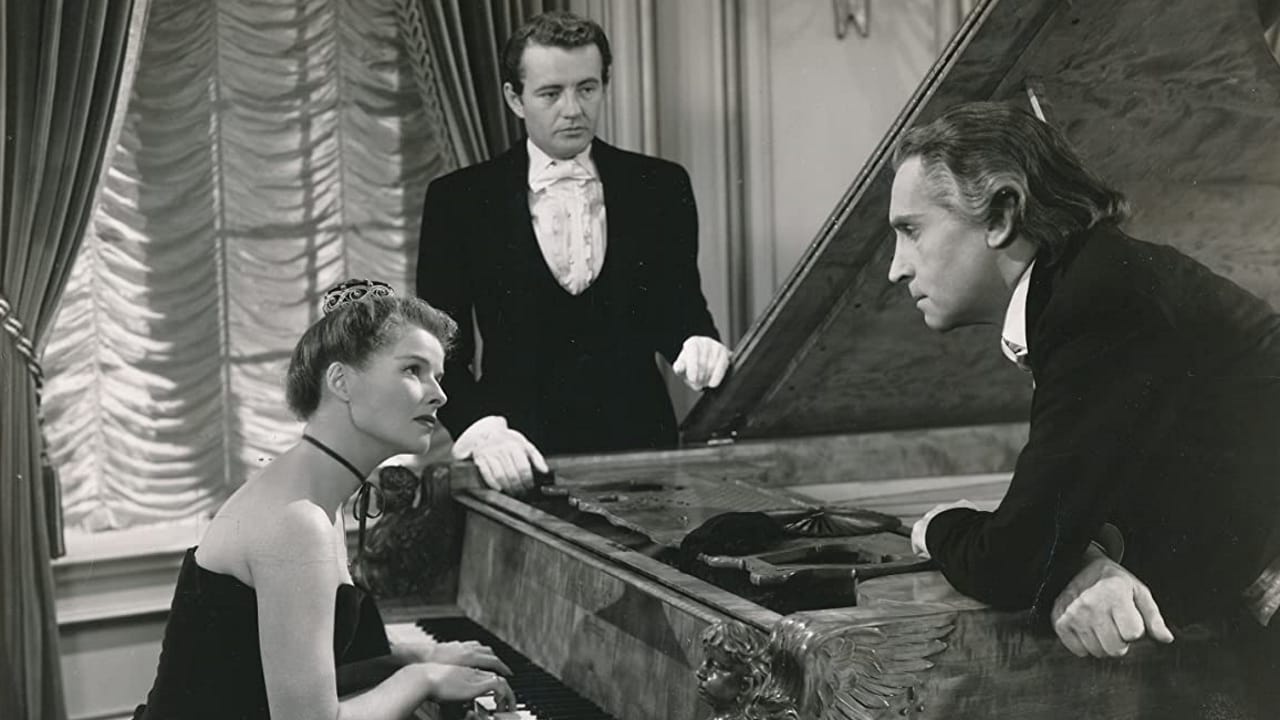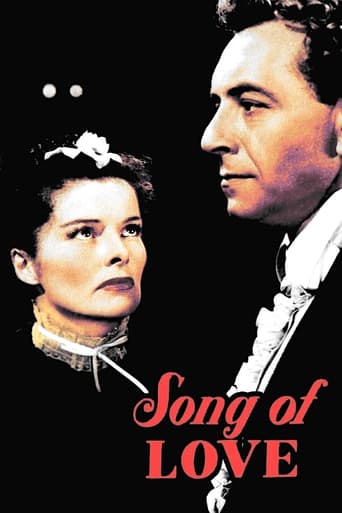

As a retired history teacher, I am always skeptical of biopics-- particularly the older ones. Too often Hollywood played fast and loose with the truth and made real people 'more interesting' by completely fictionalizing much of their lives. Fortunately, "Song of Love" sticks closer to the truth than most...though you certainly cannot take what you see as gospel. So, yes, it appears that much of what you see (including Brahms falling in love with Mrs. Schumann) did happen....though maybe not exactly how and exactly when you see in the film--and, interestingly, the prologue of the film actually admits this!As far as the film goes, it's competently acted and looks lovely. Not surprisingly, it has a lot of music--perhaps too much to interest the average viewer. I like classical and romantic music but I found my attention waning during some of the longer musical interludes. Still, it is interesting and reasonably well made. Not at all a must-see but worth seeing.
... View MoreRegardless of what one thinks of the film itself, it's truly remarkable how Kate Hepburn worked at "fingersinking" the piano. It may be the best job of visual piano playing in all film and Artur Rubinstein, who supplied most of the piano soundtrack (uncredited), said that Hepburn looked as if she were a born pianist. However, sorry to disappoint all those Henry Daniell fans, but in the party scene, where Liszt plays the Miphisto Waltz and Widmung, the pianist was actually the legendary and mysterious Ervin Nyiregyhazi. Notice that in closeups, only Daniell's face and upper body are seen, head-on. But seen from afar in full body shots, and in closeups of Liszt's hands playing the keyboard, it's Nyiregyhazi, who was chosen because he looked much like Daniell and had long,slender fingers like Liszt. Nyiregyhazi's hands were also used for those of Chopin in Song to Remember, while Jose Iturbi played on the soundtrack.
... View MoreKatherine Hepburn would seem ideally cast to play a wildly talented woman (Clara Wieck was one of the great 19th-century pianists, an amazing feat in an era when women were not supposed to have "careers") who has to break away from her father to lead her own life.In some ways, Katherine Hepburn's performance as Clara Wieck is one of her best, simply because she has relatively weak material to work with, and her ability to give it life becomes apparent -- she brings real passion to what, from another performer's mouth, would sound silly. Ditto for Robert Walker, whose Brahms is self-assured and even a bit wise-ass at times, not far-removed from the real Brahms. Both take trite and thrice-heard dialog and give it imaginative treatment."Song of Love" makes lavish use of Schumann's music (mostly piano -- his orchestral works aren't even acknowledged), with outstanding performances by an uncredited pianist, and the MGM house orchestra conducted by William Steinberg, who went on to conduct the Pittsburgh Symphony. The performances are _so_ good, I'd like to hear the complete versions (if there were any) apart from the film.Amazingly, Hepburn, Henreid, Walker, and Daniell all had some degree of piano-playing skill, and we see them actually tickling the ivories in a convincing fashion. (Some of the playing appears to be undercranked, so it looks as if Clara's or Franz's fingers are flying across the keys. The film implies that Clara was nearly as good a pianist as Liszt.)Dramatically, the film is all over the place, with good scenes (Wieck pere telling Bob why he shouldn't marry Clara, Clara mouthing off to Liszt about his interference) followed by cutesy Hollywood creations (Clara encouraging Bob & John to kill a chicken for New Year's Eve dinner). The movie's principal failing is its shortness -- we never see Bob & Clara actually falling in love -- and the inability to move Bob past the point of The Tortured Composer Without Recognition Suffering From Mental Illness Of An Unidentified Sort. Bob & Clara had an intense sex life (Clara marked her journal to indicate when they had sex -- there are a _lot_ of marks), and the film suffers (as, oddly, "Brokeback Mountain" does) from the lack of an intense and passionate scene of love-making. There are times when sexual explicitness /is/ appropriate.As a classical-music lover, I bring an interest and prejudice to this film the average viewer lacks. (I cried at a few spots, mostly because of my fondness for the Schumann-Ruckert "Widmung", which gets heavy use.) How they will react to this film, I don't know. But it's worth seeing to hear the excellent music and to see how fine actors handle less-than-great material.The "triangle" among Bob & Clara & John is a fascinating subject and perhaps an adventurous filmmaker will someday create an "Amadeus"-like film about it. In the meantime, you can enjoy Jan Swafford's excellent biography of Brahms.
... View MoreConsidering this screenplay was for a major film studio and geared for the general public, rather than professional musicians or scholars, the five writers who contributed to the script did a decent job.Centered in the enactment is that of Clara Wieck, played fervently by Katherine Hepburn, who enjoyed a full life of commitment to her composer husband Robert Schumann, large family and artistic ideals.Clara's strength held the household together, which included border composer Johannes Brahms, played earnestly by Robert Walker. Paul Henried has the difficult assignment of portraying Robert, a musical genius suffering from depression. Whereas today medication easily placates these symptoms, in the 19th century, people just had to suffer from the ailment, which affected all those around. Henried manages the role with sensitivity. Clara was known to eschew technical "brilliance" that was the earmark of Franz Liszt, and in one telling scene she conveys her embodiment of "loving simplicity" over Lisztian "show." It's a provoking moment that conjures relevance today, where "young piano whiz kids" often may play up a storm technically, while seldom penetrating the spiritual heart of the score. Clara apparently was one of the strongest women of the 19th century, in a male-dominated society, successfully surmounting a father's legal challenge of her marriage, the deaths of a number of her children, and a husband who constantly needed attention--all the while composing, arranging, and giving concerts. In a touching scene Walker's Jonannes admits to his love for Hepburn's Clara. It's not a far-fetched scene, according to musicologists, though there's hardly concrete proof for substantiation. The film is rich in the works of Brahms, Schumann and Liszt, and Hepburn and Henry Danielle (as Liszt) do commendable physical renderings of mock piano playing to sublime recordings of Artur Rubenstein. Clarence Brown directs with his usual sure hand.
... View More